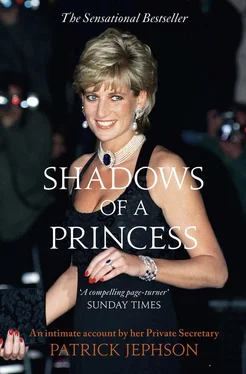1 ...7 8 9 11 12 13 ...32 The royal household is sometimes still caricatured as being made up of faceless courtiers drawn from public schools and the Army. During my time there, it was still quite true that both types were in the majority. Even those from a City or diplomatic background had mostly worn uniform at some stage, but despite a predictably establishment outlook – which I shared – most also had a very realistic attitude to the institution they served. They had inherited a hidebound, antique machine. To make it work they had to be highly effective in the real world of power and personalities which ran national life – but they also had to be sensitive to the hothouse family politics of the royal world. It was sometimes an impossible job. Failure was always headline news and any success had to be passed modestly upwards.
In a minority of cases, however, it was painfully apparent that the only journey some had taken to be reborn as courtiers was the short march from Wellington Barracks to Buckingham Palace. Their tone and style of working were therefore vaguely familiar to anyone who had ever humoured an unstable commanding officer or in turn meted out patronizing encouragement to a subordinate. My first ‘chat’ was with a prime specimen of this type. Order, precedent and self-preservation were everything to him, which left little room, I observed, for intellect. It became apparent quite early in our conversation that it also left little room for humour, insight, empathy or outside interests of any kind. These were optional in his post and, I suspected, in his world.
He clearly had a dilemma. His self-appointed task was to brief junior new arrivals such as myself about aspects of life at court. Under this heading he included the history of the British monarchy (a bizarre account of his own making), its relevance to modern Britain (akin to his own), and how an insect such as I should hold his knife and fork (an exaggeration, but only just). This performance may have been for our benefit but it was undoubtedly also for his own, since it gave us newcomers a wonderful opportunity to marvel at his mastery of arcane and irrelevant information. However, he plainly suffered doubts as to whether we were suitable receptacles for such priceless wisdom. I fear I did little to set his mind at rest, either then or in our subsequent uneasy encounters.
‘Above all,’ he said, leaning forward for emphasis and fixing me with a watery glare, ‘we don’t want any nonsenses ! Nonsenses always lead to nausea !’ He sat back, obviously feeling that no further explanation was required. There was a pause, presumably to allow me to dwell on my capacity for nonsenses. It seemed infinite to both of us.
‘Thank you,’ I said, already aware that hollow pleasantries would be a necessity of life in this place. Then, seeing an opportunity, I added, ‘I really should be getting back …’
He took this news quite well, despite the fact that he had barely warmed to his theme. He left me feeling that I was but a passing aberration on the seamless splendour of royal existence. That may have been quite true, but it did not stop me outlasting him by many years.
Looking back, I now know that he was an exception to the general rule about the Queen’s advisers who, almost to a man, I found to embody the qualities for which I unkindly judged this particular individual had no excess cranial capacity. At the time, however, I thought him a caricature and a good example of a species on the edge of extinction – which, incidentally, is where it remains.
My next encounter was with a representative of the newer generation. Back at St James’s, I had time for a chipped mug of weak tea before the next stage of my indoctrination. I knew instinctively that I was about to learn matters of real relevance from an instructor who would closely monitor my performance, or lack of it. She would become one of the two most important women in my working life: the lady-in-waiting and assistant private secretary to Her Royal Highness the Princess of Wales, Miss Anne Beckwith-Smith.
Anne had been with the Princess from the start. In a world built on precedent, she had created most of the procedures and conventions by which even our little office needed to function. She set an example of dignity and common sense which belied our subordinate status. Later I discovered that she was also a lot of fun. But on day one I recognized her as a formidable ambassador for her mistress, unlikely to be tolerant of any backsliding on my part.
Her office was the most attractive in St James’s. Formerly a royal dressing room (when our quarters had been a royal residence), it retained an air of domesticity enhanced by Anne’s tasteful choice of decor. A wide bay window looked down into Ambassador’s Court, offering an ideal vantage point from which to observe the daily traffic of the Palace’s visitors and occupants. To me it seemed like a boudoir crossed with a throne room, an impression reinforced as I approached the desk behind which Anne presided with a magisterial presence.
She was just one of many courtiers who had a difficult decision to make when faced with a new recruit such as myself: How much do we tell him? For the next half hour I listened attentively to Anne’s introduction to the workings of the Princess’s office, and although this was accurate and informative, it left me still largely ignorant about the most important factor of all, namely what went on in the mind of the Princess. By what Anne left out on this subject I drew a generally accurate conclusion about Palace life – admit nothing to anyone, especially if they are new. Let them find out for themselves, the hard way.
In obedience to this principle Anne stuck to what I naively thought were trivia. She explained my responsibility to look after the ladies-in-waiting who would accompany the Princess on all her official engagements. ‘You must make sure they have their programme and briefing notes at least a week before each engagement,’ she told me, rather optimistically as it turned out. ‘And you must help them out whenever they need helping out.’
Out of what? I wondered. Cars? Lifts? In fact it was both, among many other things, including that state of Siberian ostracism to which our mistress occasionally committed all who served her closely. Anne, of course, knew that such unwelcome experiences of ‘helping out’ would come my way soon enough. How I dealt with them would be an interesting test for me which I could be sure would be closely monitored.
Anne had been in the Wales business quite long enough to know that the marriage was now largely a sham. Thanks to tabloid coverage of separate sleeping arrangements on the recent German tour, almost anyone else could now come to the same conclusion. She knew also that this created powerful forces that could blow apart the image of normality that we existed to protect. There would be untold consequences, not least for the constitution, and never far from her thoughts was the potential effect on Princes William and Harry. Nothing was said about any of this in that first meeting.
In the Navy I had been used to living by the ‘need to know’ principle. It was elementary security practice to restrict sensitive information just to those personnel who needed it to carry out their tasks. A rather haphazard version of this operated at the Palace. Those who knew the fractured state of the Waleses’ marriage were like members of a secret society, bound by loyalty to their employers. Membership was not to be granted lightly to the new temporary equerry. For one thing, he may be out on his ear next week if he fouls up, and for another, the more people we tell, the more difficult it is to pretend that things might yet get better.
So I had to find out for myself, which I did, but only detail by painful detail over a long period of time. By then I had some sympathy for the hidebound old guard. How much more reassuring simply to lecture the new boys on regimental history and mess rules.
Читать дальше












